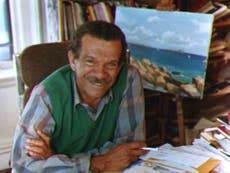Love and Other Acts of Violence review: A little out of time
Cordelia Lynn’s latest play is a series of echoes, an arch meditation on inherited trauma and cycles of interpersonal and societal violence

Stop me if you’ve heard this one before. A young couple meet at a party. He is brash, nervous, and talks too much about the protests he’s organising at his university. She is reserved, put off by his zeal, but ultimately charmed. Their relationship unfurls, slowly and then quickly, all while the world behind them begins to burn.
Cordelia Lynn’s latest play is a series of echoes, an arch meditation on inherited trauma and cycles of interpersonal and societal violence, but it starts off in the vein of Duncan Macmillan’s Lungs or Nick Payne’s Constellations: a series of elliptical conversations that fuse the existential and the sensual, charting the decade-long relationship between two erudite, middle-class university professors, a play peppered through with winking lines like, “It’s our socialist duty to reduce the orgasm deficit.” The writing still shines, despite the familiarity: Lynn has a rhythmic ear, and there is something irresistible in the verbal tennis Tom Mothersdale’s Him and Abigail Weinstock’s Her play with each other.
The difference is in the seams of cruelty that run through their affair: as the society around them collapses into a fascist state, moments of violence splinter through their relationship. As the passionate activist and poet, Mothersdale has a rangy, mercurial charisma, agitated and prowling around the stage. His tactics alarm Weinstock’s more controlled Jewish university physicist, a woman who wants to believe in the goodness of the state but holds a well of inherited grief in her body.
Elayce Ismail’s direction gestures towards sensuality, and their chemistry is palpable. Yarit Dor’s movement direction is tactile, often right on the edge of lustful and threatening, and is underscored by Joshua Pharo’s visceral lighting, which occasionally glitches red and plunges the couple into abrupt darkness. And Lynn’s rat-a-tat dialogue is punctured through with poetic interludes; glimpses into Him and Her’s psyches which aim to be stabs of pure id (“There are no roads that lead me back to him because the skin is an organ of memory”) but tend to feel a little grandiose.
And for all that it explores carnality, there is an unshakeable sense of remove to the play. Lynn takes pains to emphasise its unspecified location, the idea being that the rise of fascism could (and does) occur in any contemporary western metropolis: and indeed, Basia Bińkowska’s initial design rejects naturalism, stranding the couple on washed wooden boards, a life raft rising out of the mounds of dirt around them.
Their world makes the initially insidious and then overt creep towards a totalitarian state, and yet there is something curiously vague about the way in which this is depicted: general mentions of women not being able to study and the police suddenly being permitted to carry guns. It’s chilling, yes, but there is still something awkwardly gestural and nonspecific about these moments. It is as if the production believes that engaging directly with the quite real ways in which the UK is itself mired in fascist ideology might somehow cheapen or date the play. But in the end, by suggesting that this could happen anywhere, it feels like it happens nowhere.
History rhymes, Lynn is keen to tell us, and the play’s epilogue is seeded in warm naturalism, bringing with it a potent, properly grounded mix of cruelty and pathos, though there is still a neatness to its resolution that comes across as somewhat pat. A play which, for all its gestures, feels a little out of time.
‘Love and Other Acts of Violence’ runs at the Donmar Warehouse until 27 November



Join our commenting forum
Join thought-provoking conversations, follow other Independent readers and see their replies
Comments